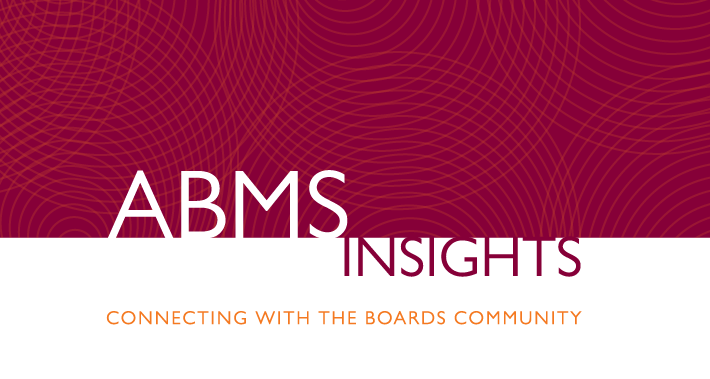
Research shows that American Board of Medical Specialties (ABMS) Member Boards’ formative assessments for continuing certification have helped board certified physicians and medical specialists gain medical knowledge that directly impacts patient care.

With the rapid pace of change in medicine, keeping current is imperative. So is using tools that support learning by providing timely feedback on performance and identifying gaps in knowledge. Moreover, formative assessments taken over several years are used by Member Boards to reach a summative decision about a physician’s or medical specialist’s certification status. This important step in the certification process aligns the learning with demonstrated specialty knowledge and judgment as shown in the following studies and surveys.
The majority of pediatricians (91%) responding to a 2021 survey about MOCA-Peds indicated they had learned, refreshed, or enhanced their medical knowledge as a result of participating in the longitudinal assessment. This is roughly equivalent to what pediatricians (90%) said in 2020, according to the American Board of Pediatrics, which has sent an end-of-the-year survey since 2019; one of the mechanisms the board has used to gather feedback from pediatricians participating in MOCA-Peds. The majority of survey respondents (63%) also reported that they had either already applied what they learned from MOCA-Peds to their clinical practice or they (20%) planned to do so in the future. These numbers were slightly higher than in 2020.
In quarterly surveys of family physicians participating in the American Board of Family Medicine’s (ABFM) Family Medicine Certification Longitudinal Assessment (FMCLA) between 2019 and 2022, nearly all (99%) rated it as being relevant to the specialty of family medicine and 95 percent indicated that the questions were relevant to their current practice, Regarding learning, 95 percent took advantage of the references used, and the majority indicated that they reviewed item critiques, whether or not they answered the question correctly, according to ABFM. As important, 85 percent sought more information about a clinical topic after completing each quarter. Eighty-four percent reported having changed their practice as a result of participating in FMCLA. On average, 75 percent of eligible physicians selected FMCLA each year while the remainder opted to utilize the traditional one-day secure examination. To date, the retention rate among participants of FMCLA, which ABFM implemented in 2019, is more than 98 percent. Ninety-two percent have reported experiencing less anxiety participating in FMCLA compared with taking the one-day exam, which speaks to the value of longitudinal assessment on physician well-being.
In 2020, the American Board of Medical Genetics and Genomics replaced its traditional secure exam with CertLink®, following a successful two-year pilot. With 64 percent of eligible medical geneticists participating in the pilot, 94 percent of medical geneticists surveyed at the conclusion of the pilot in 2019 said the questions were useful learning tools, 96 percent indicated that CertLink is a feasible method for keeping current, and 90 percent said it helped identify knowledge gaps.
More than 90 percent of psychiatrists and neurologists participating in the pilot for the American Board of Psychiatry and Neurology’s Article-Based Continuing Certification Pathway agreed that the journal articles were easy to access, helpful to practice, and the corresponding exams offered a fair assessment, according to a study published in the spring 2022 issue of the Journal of Continuing Education in the Health Professions. ABPN introduced its point-in-time assessment in 2022.
Following a three-year pilot, the American Board of Nuclear Medicine (ABNM) began offering CertLink as an alternative to its Maintenance of Certification (MOC) exam. Ninety-nine percent of participating nuclear medicine specialists who responded to feedback surveys sent in 2020 reported that the CertLink questions were useful learning tools and 89 percent found the questions helpful for keeping current.
After introducing the American Board of Orthopaedic Surgery Web-Based Longitudinal Assessment (ABOS WLA) in 2019, orthopaedic surgeons responded positively about the longitudinal assessment in a 2022 survey. Eighty-seven percent agreed that the ABOS WLA helped keep them current in orthopaedic surgery, 83 percent agreed that it helped them provide better patient care, and 77 percent agreed that the ABOS WLA helped identify and fill knowledge gaps.
To date, more than half of board certified colon and rectal surgeons are participating in CertLink, with which the American Board of Colon and Rectal Surgery (ABCRS) replaced its 10-year MOC exam. Since pilot testing in 2018, more than 93 percent of participating surgeons indicated that they prefer CertLink instead of the traditional secure exam, and 86 percent found it to be a valuable learning experience.
Seventy-three percent of anesthesiologists responding to the American Board of Anesthesiology’s 2023 MOCA Survey agreed that MOCA Minute helps them keep their medical knowledge up to date. Eighty-seven percent of survey respondents found MOCA Minute a valuable component of the MOCA program. Overall, physicians believe MOCA Minute provides a great opportunity to review topics throughout the year, alleviating the burden of studying for a recertification exam and enhancing their knowledge of the specialty.
In a 2021 survey, 83 percent of physiatrists who participated in the American Board of Physical Medicine and Rehabilitation’s (ABPMR) LA-PM&R indicated that they learned, refreshed, or enhanced their medical knowledge by answering questions and reading rationales as part of the longitudinal assessment. Overall, physiatrists found the LA-PM&R much more relevant, convenient, and valuable than the MOC Exam. After completing a one-year pilot, ABPMR introduced LA-PM&R in 2020.
In fact, ABPMR published a study demonstrating that physiatrists who participated in LAPM&R learned and retained more information than those taking the MOC exam. The study was published in the May 2020 issue of the American Journal of Physical Medicine and Rehabilitation. The American Board of Obstetrics and Gynecology published its own study in the May 2020 issue of Obstetrics & Gynecology with similar results about obstetricians/gynecologists who participated in its article-based assessment.
Participating in longitudinal assessment also improved performance on cognitive exams. Participating in CertLink was positively correlated to the performance on the initial certification and MOC examinations for nuclear medicine specialists, according to ABNM. Anesthesiologists who participated in the MOCA Minute pilot performed better on the MOCA Cognitive Examination than those who did not participate in the pilot, reports a study published in the November 2016 issue of Anesthesiology. Moreover, timely participation and meeting performance standards in MOCA Minute were associated with lower incidences of disciplinary actions by a state medical board for anesthesiologists, according to a study published in the November 2019 issue of Anesthesia & Analgesia.
As these examples illustrate, Member Boards’ formative assessments are effective tools that support physician learning in myriad ways. They assist board certified physicians and medical specialists in gaining medical knowledge, provide timely performance feedback, and identify knowledge gaps, all of which positively impact the care and treatment of their patients.
ABMS Receives Innovator Award for CertLink
ABMS received the 2022 Innovator Award from the Institute for Credentialing Excellence for its development of CertLink, which has an overall 98 percent approval rating. The Innovator Award recognizes an organization for creating “an innovative approach to a product, policy, process, or system that transforms or achieves a new level of success in a unique and innovative way and also is transformative and replicable for other individuals/organizations.” Read more.
© 2023 American Board of Medical Specialties®
Read the latest issue of ABMS Insights and sign up to receive quarterly updates about board certification.
